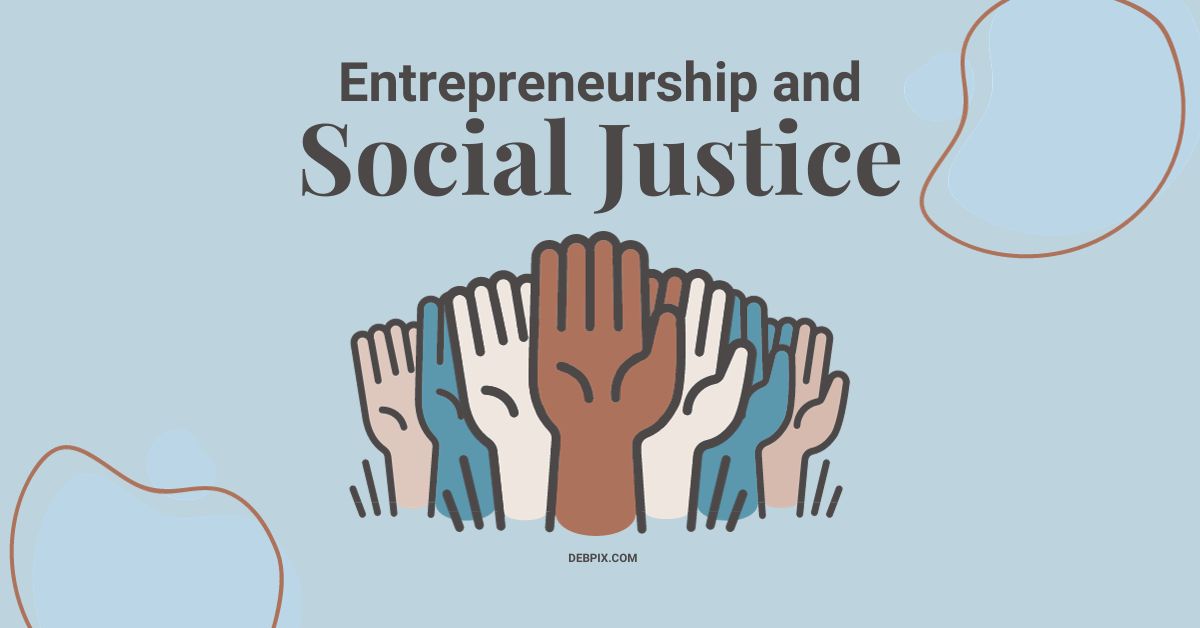In a world where entrepreneurship and social justice might seem like separate realms, there's a powerful synergy waiting to be explored and implemented by those who value both. As a multi-discipline entrepreneur, I firmly believe that small businesses can become catalysts for positive change. Let's delve into the transformative potential of mixing entrepreneurship or small business with social justice, a topic close to my heart.
Table of Contents
- The Power of Purpose-Driven Entrepreneurship:
- A Case Study: DEBPIX and Social Justice:
- More Case Studies:
- Cautionary Insights for Those Considering Making a Stand
- Conclusion:

The Power of Purpose-Driven Entrepreneurship:
At the core of every successful small business lies a passionate entrepreneur with a vision. Despite the recent “woke” backlash and concerns about “cancel culture,” more and more entrepreneurs today are weaving social justice into our business models, recognizing that we can be drivers of meaningful impact beyond profits. This shift towards purpose-driven entrepreneurship is a response to the growing demand from consumers who want to support businesses that align with their values. I am definitely one of those consumers.
Ask yourself: What change do I want to see in the world? How can my business address societal challenges?
Choosing the Right Cause:
Entrepreneurs often start by identifying a cause that resonates with our values and the mission of our business. Whether it's environmental sustainability, gender equality, racial justice, or poverty alleviation, selecting the right cause (or causes) is pivotal.

Building Inclusivity and Diversity:
An inclusive workforce can lead to diverse perspectives and innovative ideas. Make a conscious effort to create a work environment that embraces people of all backgrounds, experiences, and identities.
Incorporating Social Responsibility:
Small businesses can integrate social justice into our operations by practicing fair labor, reducing our environmental footprint, and supporting marginalized communities. Consider adopting fair trade practices and ensuring ethical sourcing of materials. This not only benefits the artisans but also supports a sustainable and just supply chain.
Community Engagement:
Building strong ties with local communities can foster a sense of social responsibility. Take your business beyond transactions and connect with the community. Entrepreneurs can engage in initiatives such as mentorship programs, volunteering, or partnerships with nonprofits to make a positive impact. Support local causes or donate a percentage of profits to social initiatives. Engaging with the community fosters goodwill and brings about lasting change.
Educational Advocacy and Policy Influence:

Using our platform as an entrepreneur to educate and advocate for social justice issues can be a powerful tool. This might involve creating informative content (blogs, marketing campaigns, etc.), hosting events, or even collaborating with like-minded organizations. Entrepreneurs possess a unique voice and influence in society. Use that power to raise awareness and advocate for policies that promote equality, fair wages, and sustainability. Participate in dialogues that drive change at a systemic level.
A Case Study: DEBPIX and Social Justice:
As an entrepreneur, I've always been committed to creating art and designs with a purpose. Through my designs and products, I've aimed to address societal issues, promote diversity, equity, and inclusion, and raise awareness about women's and mental health issues.
Art as a Catalyst for Change:
I believe that art has the power to unite politics, culture, and creative expression. DEBPIX's products, from digital and paperback books, stationery, and other products are often created in support and/or carry messages of empowerment and social justice.
Educational Resources:
DEBPIX offers a range of themed paperback and digital books, including word searches, puzzles, coloring books, and journals designed to educate and inspire. These resources serve as tools for both learning and reflection both personally and on critical social issues.
More Case Studies:
Let's take a look at a few inspiring examples of entrepreneurs who are making a difference:
Fair Trade Fashion: Small clothing brands are adopting fair trade practices, ensuring that artisans and workers in developing countries are paid fair wages. This promotes economic justice and empowers vulnerable communities.
Local Artisan Markets: Entrepreneurial endeavors like local artisan markets provide a platform for marginalized artists to showcase and sell their work, thus amplifying their voices and promoting cultural diversity.
Community Initiatives: Some entrepreneurs are launching community-driven initiatives, like urban gardens and food co-ops, to address food deserts and promote access to healthy, affordable food.
Tech Startups for Social Good: Tech entrepreneurs are developing apps and platforms that address issues like mental health, education, and social connectivity, making vital resources more accessible.
Cautionary Insights for Those Considering Making a Stand
Engaging in and making a stance on social justice issues can be a powerful way for entrepreneurs and small businesses to create positive change. However, it's important to consider that there are potential drawbacks and challenges to this approach. Here are some potential cons to be aware of:

Risk of Alienating Customers: Taking a public stance on social justice issues can alienate some customers who have differing viewpoints. This may lead to boycotts or negative reviews, potentially impacting the business's revenue.
Navigating Controversy: Social justice issues can be deeply polarizing, and businesses that wade into controversial topics may find themselves embroiled in public disputes and debates that can harm their brand reputation.
Resource Allocation: Engaging in social justice efforts can divert resources, both financial and human, away from core business activities. This may impact the company's ability to grow or compete effectively.
Inauthenticity Concerns: If a business's engagement with social justice issues is perceived as inauthentic or merely a marketing strategy (also known as “woke-washing”), it can damage trust and credibility among customers and stakeholders.
Legal and Regulatory Risks: Depending on the nature of the social justice initiatives, there may be legal and regulatory risks involved. Businesses must ensure that they comply with all relevant laws and regulations.
Employee Division: Just as customers can have differing views, so can employees. Taking a public stance on social justice issues can lead to internal division and conflicts among staff members.
Sustainability: Businesses should be cautious about the long-term sustainability of their social justice efforts. Committing to a cause and then abandoning it when it's no longer in the public eye can lead to criticism and mistrust.
Brand Dilution: Overcommitting to multiple social justice causes or constantly shifting positions can dilute the impact of a business's efforts and make it less clear what the company truly stands for.
Misalignment with Target Audience: If a business's core audience is not receptive to its social justice stance, it may lead to a decline in customer loyalty and sales.
Reputation Management: Managing the reputation of a business that engages in social justice issues can be challenging. Negative publicity or controversies can tarnish a brand's image.
In summary, while there are certainly advantages to businesses engaging in social justice causes, it's essential for entrepreneurs and small businesses to carefully consider the potential drawbacks and develop strategies to mitigate these risks. It's important to approach these issues thoughtfully and authentically to ensure that the benefits outweigh the cons.
Conclusion:
The intersection of entrepreneurship and social justice is a space where meaningful change can flourish. As an entrepreneur, you have the power to make conscious choices that impact not only your business's success but also society at large. By weaving social justice into your entrepreneurial journey, you can create a business with purpose, inspire others, and be a force for positive transformation.

In the words of Maya Angelou, “Do the best you can until you know better. Then when you know better, do better.” Let us all strive to do better by combining our entrepreneurial spirit with a commitment to social justice, leaving a lasting legacy of positive change.




